-
 Bitcoin
Bitcoin $113900
-1.39% -
 Ethereum
Ethereum $3517
-4.15% -
 XRP
XRP $3.009
1.59% -
 Tether USDt
Tether USDt $0.9997
-0.04% -
 BNB
BNB $766.8
-1.41% -
 Solana
Solana $164.6
-2.38% -
 USDC
USDC $0.9998
-0.02% -
 TRON
TRON $0.3277
0.65% -
 Dogecoin
Dogecoin $0.2023
-1.67% -
 Cardano
Cardano $0.7246
0.05% -
 Hyperliquid
Hyperliquid $38.27
-4.77% -
 Sui
Sui $3.528
-0.52% -
 Stellar
Stellar $0.3890
-0.73% -
 Chainlink
Chainlink $16.16
-2.69% -
 Bitcoin Cash
Bitcoin Cash $539.9
-4.38% -
 Hedera
Hedera $0.2425
-2.00% -
 Avalanche
Avalanche $21.71
-0.97% -
 Toncoin
Toncoin $3.662
5.73% -
 Ethena USDe
Ethena USDe $1.000
-0.02% -
 UNUS SED LEO
UNUS SED LEO $8.964
0.35% -
 Litecoin
Litecoin $107.7
2.33% -
 Shiba Inu
Shiba Inu $0.00001223
-0.40% -
 Polkadot
Polkadot $3.617
-0.97% -
 Uniswap
Uniswap $9.052
-2.49% -
 Monero
Monero $295.1
-3.79% -
 Dai
Dai $0.9999
0.00% -
 Bitget Token
Bitget Token $4.315
-1.85% -
 Pepe
Pepe $0.00001060
0.11% -
 Cronos
Cronos $0.1342
-2.72% -
 Aave
Aave $256.0
-0.87%
How to store DEEP coins safely? Which is better, cold wallet or hot wallet?
For secure DEEP coin storage, choose cold wallets like hardware or paper for safety, or hot wallets for convenience, despite higher hacking risks.
May 21, 2025 at 01:49 am
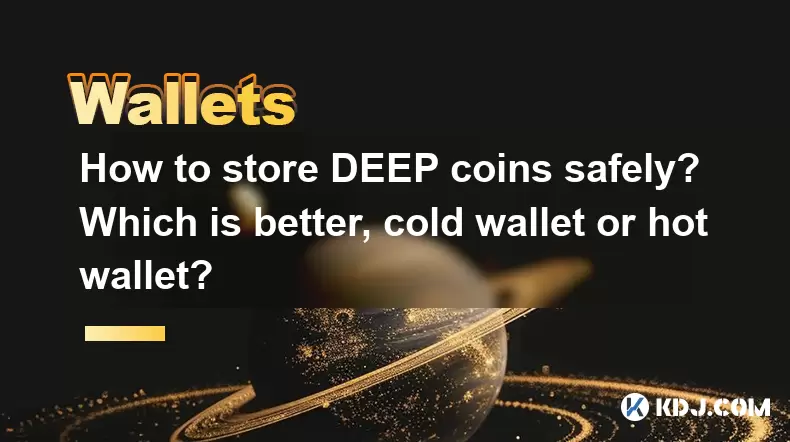
Storing DEEP coins safely is a critical concern for any cryptocurrency holder. DEEP coins, like other cryptocurrencies, are digital assets that require secure storage to protect them from theft and loss. There are two primary types of wallets for storing DEEP coins: cold wallets and hot wallets. Each has its own set of advantages and disadvantages, and understanding these can help you make an informed decision about which is better for your needs.
Understanding Cold Wallets
Cold wallets are offline storage solutions that keep your DEEP coins completely disconnected from the internet. This isolation significantly reduces the risk of hacking and unauthorized access. There are several types of cold wallets available, including hardware wallets, paper wallets, and even physical storage devices like USB drives.
Hardware Wallets: These are physical devices designed specifically for storing cryptocurrencies. Popular options include Ledger Nano S and Trezor. To use a hardware wallet for DEEP coins, follow these steps:
- Purchase a hardware wallet from a reputable seller.
- Set up the device by following the manufacturer's instructions, which typically involve creating a new wallet and generating a seed phrase.
- Transfer your DEEP coins to the wallet's address using your current storage method.
- Securely store the seed phrase in a safe place, as it is crucial for recovering your wallet if the device is lost or damaged.
Paper Wallets: These involve printing your public and private keys on a piece of paper. To create a paper wallet for DEEP coins:
- Use a trusted paper wallet generator to create a new wallet.
- Print the wallet on a printer that is not connected to the internet.
- Store the paper in a secure location, such as a safe or a locked drawer.
Physical Storage Devices: You can store your DEEP coins on a USB drive or an external hard drive. To do this:
- Use a secure computer that is not connected to the internet.
- Create a new wallet using software like Electrum or MyEtherWallet.
- Save the wallet file to the USB drive or external hard drive.
- Disconnect the device and store it in a safe place.
Understanding Hot Wallets
Hot wallets are online storage solutions that are connected to the internet. They are more convenient for frequent transactions but come with a higher risk of hacking. Examples of hot wallets include software wallets installed on your computer or mobile device, as well as web-based wallets.
Software Wallets: These are applications you download and install on your computer or smartphone. To set up a software wallet for DEEP coins:
- Download a reputable software wallet compatible with DEEP coins, such as MetaMask or Trust Wallet.
- Follow the installation instructions to set up the wallet.
- Create a new wallet and securely store the recovery phrase.
- Transfer your DEEP coins to the wallet's address.
Web Wallets: These are online services that allow you to store and manage your DEEP coins through a web browser. To use a web wallet:
- Choose a trusted web wallet service that supports DEEP coins.
- Create an account and set up a new wallet.
- Enable two-factor authentication (2FA) for added security.
- Transfer your DEEP coins to the wallet's address.
Comparing Cold Wallets and Hot Wallets
When deciding between a cold wallet and a hot wallet for storing your DEEP coins, it is important to consider several factors:
Security: Cold wallets offer superior security because they are not connected to the internet. Hot wallets, while more convenient, are vulnerable to online attacks.
Convenience: Hot wallets are easier to use for frequent transactions, as they are always connected to the internet. Cold wallets require more effort to access and transfer funds.
Cost: Cold wallets, particularly hardware wallets, often come with a higher upfront cost. Hot wallets are typically free or low-cost, but you may need to pay transaction fees.
Accessibility: Hot wallets are accessible from any device with an internet connection. Cold wallets require physical access to the device or paper.
Best Practices for Storing DEEP Coins
Regardless of whether you choose a cold wallet or a hot wallet, there are several best practices you should follow to keep your DEEP coins safe:
Backup Your Wallet: Always create a backup of your wallet, especially the recovery phrase or seed. Store this backup in a secure location separate from your primary storage.
Use Strong Passwords: If your wallet requires a password, use a strong, unique password and consider using a password manager.
Enable Two-Factor Authentication: For hot wallets, enable 2FA to add an extra layer of security.
Regularly Update Software: Keep your wallet software and any related applications up to date to protect against known vulnerabilities.
Be Wary of Phishing: Always double-check the URLs and sources of any communication related to your wallet to avoid falling victim to phishing scams.
Choosing the Right Wallet for Your Needs
The choice between a cold wallet and a hot wallet for storing DEEP coins ultimately depends on your specific needs and risk tolerance. If you prioritize security and are willing to accept less convenience, a cold wallet is the better choice. On the other hand, if you need to frequently access and transact with your DEEP coins, a hot wallet might be more suitable, despite the increased risk.
Frequently Asked Questions
Q: Can I use both a cold wallet and a hot wallet for my DEEP coins?
A: Yes, many users opt to use a combination of both. You can store the majority of your DEEP coins in a cold wallet for long-term security and keep a smaller amount in a hot wallet for daily transactions.
Q: How do I know if a wallet supports DEEP coins?
A: Before choosing a wallet, check the official website or documentation of the wallet provider to confirm that it supports DEEP coins. You can also look for user reviews and community forums for additional insights.
Q: What should I do if I lose access to my cold wallet?
A: If you lose access to your cold wallet, you can recover it using the seed phrase or recovery phrase. Ensure that you have securely stored this information in a safe place and follow the wallet manufacturer's instructions for recovery.
Q: Are there any fees associated with storing DEEP coins in a wallet?
A: While the wallet itself may not charge a fee, you may incur transaction fees when moving DEEP coins in and out of the wallet. These fees vary depending on the network congestion and the specific wallet service you use.
Disclaimer:info@kdj.com
The information provided is not trading advice. kdj.com does not assume any responsibility for any investments made based on the information provided in this article. Cryptocurrencies are highly volatile and it is highly recommended that you invest with caution after thorough research!
If you believe that the content used on this website infringes your copyright, please contact us immediately (info@kdj.com) and we will delete it promptly.
- Worldcoin, Identity, WLD Price: Decoding the NYC Crypto Buzz
- 2025-08-02 21:10:12
- Shiba Inu: Utility and Community Strength Drive Crypto's Evolution
- 2025-08-02 21:50:12
- Crypto Donations, Trump PAC, and Bitcoin: A New York Minute on Political Coin
- 2025-08-02 20:30:12
- Crypto Market Under Pressure: Bearish Momentum and Rising Volatility Take Hold
- 2025-08-02 20:30:12
- Crypto Market Carnage: Liquidations Soar as Ethereum and Bitcoin Take a Beating
- 2025-08-02 21:55:12
- DeFi Token Summer Gains: Is Mutuum Finance the Real Deal?
- 2025-08-02 18:30:12
Related knowledge

What is a watch-only wallet in Trust Wallet?
Aug 02,2025 at 03:36am
Understanding the Concept of a Watch-Only WalletA watch-only wallet in Trust Wallet allows users to monitor a cryptocurrency address without having ac...

How to switch between networks in Trust Wallet?
Aug 02,2025 at 12:36pm
Understanding Network Switching in Trust WalletSwitching between networks in Trust Wallet allows users to manage assets across different blockchains s...
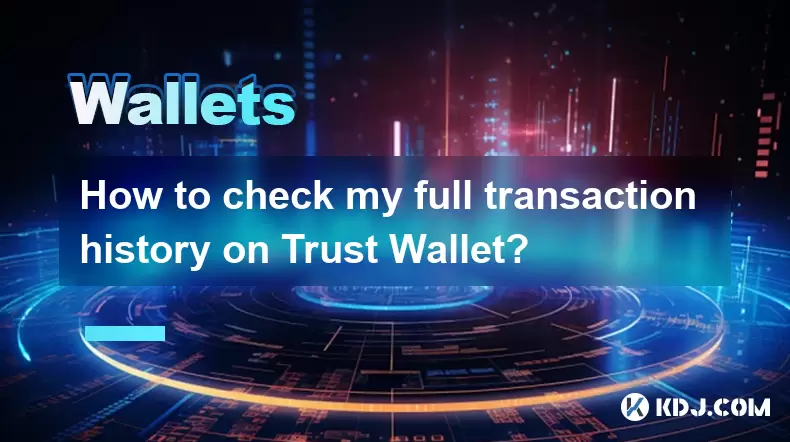
How to check my full transaction history on Trust Wallet?
Aug 02,2025 at 09:24am
Understanding Transaction History in Trust WalletTrust Wallet is a widely used non-custodial cryptocurrency wallet that supports a broad range of bloc...
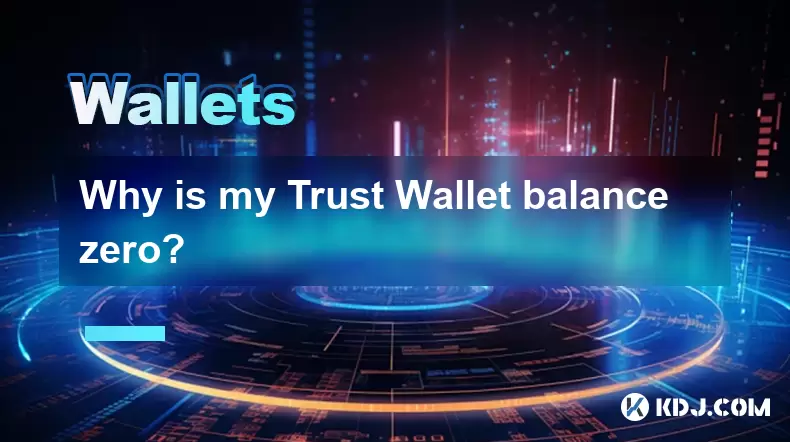
Why is my Trust Wallet balance zero?
Aug 02,2025 at 03:49am
Understanding Trust Wallet Balance Display IssuesIf you're seeing a zero balance in your Trust Wallet despite knowing you've previously received or se...
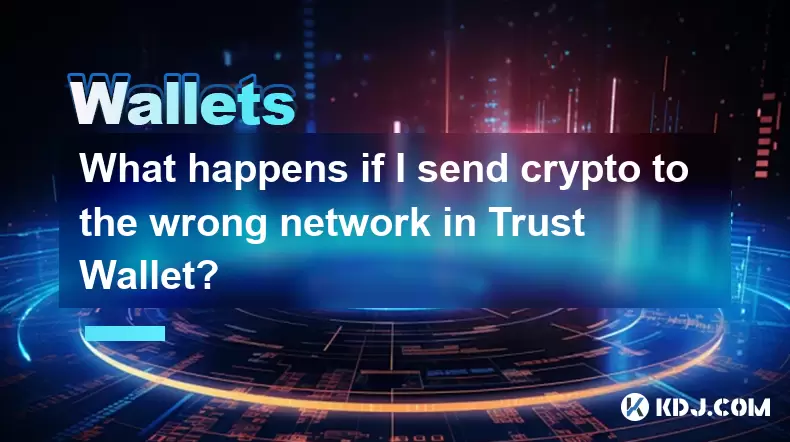
What happens if I send crypto to the wrong network in Trust Wallet?
Aug 02,2025 at 07:22pm
Understanding Network Compatibility in Trust WalletWhen using Trust Wallet, it's essential to understand that different cryptocurrencies operate on di...
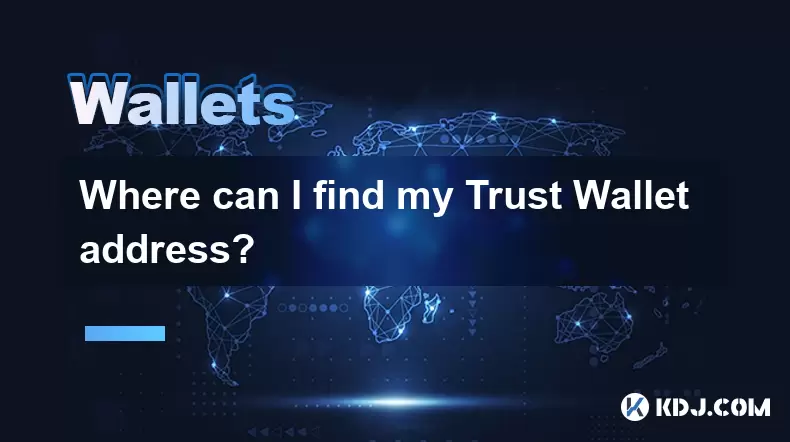
Where can I find my Trust Wallet address?
Aug 02,2025 at 06:07pm
Understanding Your Trust Wallet AddressYour Trust Wallet address is a unique identifier that allows others to send you cryptocurrency. It is a string ...

What is a watch-only wallet in Trust Wallet?
Aug 02,2025 at 03:36am
Understanding the Concept of a Watch-Only WalletA watch-only wallet in Trust Wallet allows users to monitor a cryptocurrency address without having ac...

How to switch between networks in Trust Wallet?
Aug 02,2025 at 12:36pm
Understanding Network Switching in Trust WalletSwitching between networks in Trust Wallet allows users to manage assets across different blockchains s...

How to check my full transaction history on Trust Wallet?
Aug 02,2025 at 09:24am
Understanding Transaction History in Trust WalletTrust Wallet is a widely used non-custodial cryptocurrency wallet that supports a broad range of bloc...

Why is my Trust Wallet balance zero?
Aug 02,2025 at 03:49am
Understanding Trust Wallet Balance Display IssuesIf you're seeing a zero balance in your Trust Wallet despite knowing you've previously received or se...

What happens if I send crypto to the wrong network in Trust Wallet?
Aug 02,2025 at 07:22pm
Understanding Network Compatibility in Trust WalletWhen using Trust Wallet, it's essential to understand that different cryptocurrencies operate on di...

Where can I find my Trust Wallet address?
Aug 02,2025 at 06:07pm
Understanding Your Trust Wallet AddressYour Trust Wallet address is a unique identifier that allows others to send you cryptocurrency. It is a string ...
See all articles

























































































